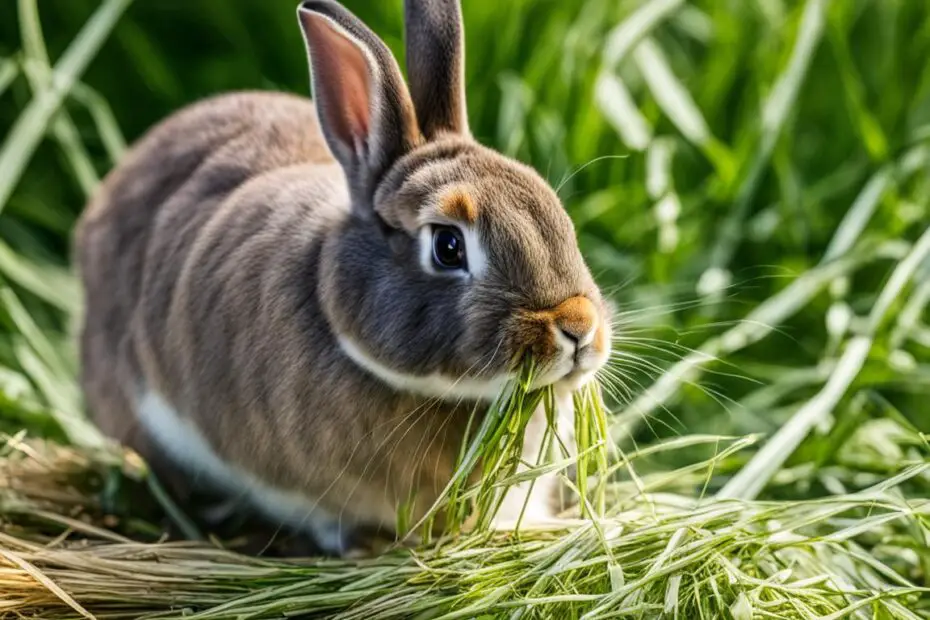Welcome to our comprehensive pet rabbit diet guide! If you’re a proud rabbit owner or considering bringing a fluffy bunny into your home, it’s essential to understand what makes up a healthy rabbit diet. Feeding your pet rabbit the right foods is crucial for their overall well-being and longevity. In this article, we’ll explore the key components of a rabbit’s diet, including hay, vegetables, fruits, and pellets, and provide you with valuable insights on how to ensure a balanced and nutritious meal plan for your furry friend.
Key Takeaways:
- Hay should make up 80-90% of a rabbit’s diet and provides essential roughage and dental health benefits.
- A small portion of pellets is necessary, with high fiber content, while treats should be given sparingly.
- Introduce new foods gradually to avoid digestive issues, and always provide fresh water for your rabbit.
The Importance of Hay in a Rabbit’s Diet
When it comes to a rabbit’s diet, hay plays a critical role. In fact, it should make up the majority of their diet, accounting for 80-90% of their daily food intake.
Hay is essential for rabbits as it provides the necessary roughage for their digestive system. It helps keep their gut healthy and aids in preventing blockages. Additionally, the act of chewing hay helps wear down their constantly growing teeth, preventing dental issues that can be painful and harmful to their overall health.
There are several types of grass hay that are beneficial for rabbits. The most popular and widely recommended types include timothy hay, orchard grass, brome, and oat hay. These grass hays are rich in fiber and provide rabbits with the necessary nutrients for optimal health.
It is important to note that alfalfa hay, while suitable for young rabbits and nursing mothers due to its higher protein and calcium content, is not recommended for adult rabbits. Adult rabbits have different nutritional needs, and alfalfa hay can be too rich for them, leading to obesity and other health issues.
To ensure the health of your pet rabbit, it’s crucial to provide a fresh and mold-free supply of hay. Make sure to store it in a cool, dry place to maintain its quality. Regularly check the hay for any signs of mold or dampness, and replace it if necessary.
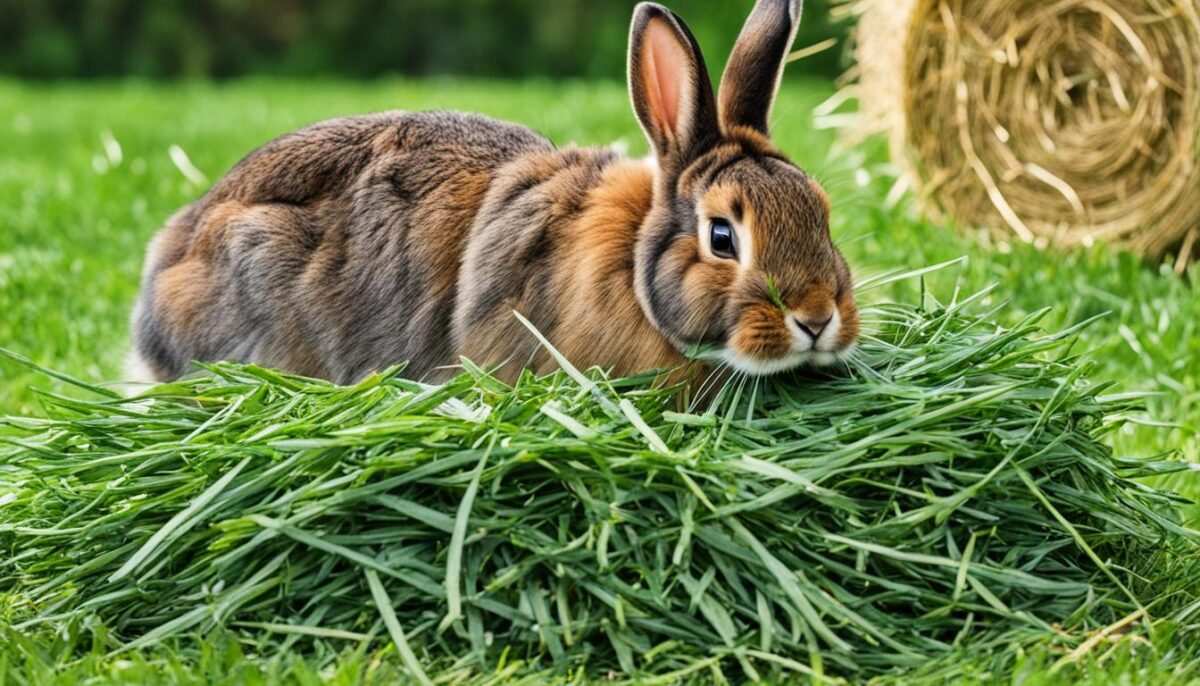
Having a constant supply of high-quality hay is essential for your rabbit’s well-being, promoting healthy digestion and supporting their overall health. So make sure your furry friend always has access to fresh hay!
Bunny Pellets and Their Role in the Diet
Bunny pellets play a crucial role in a rabbit’s diet, providing essential nutrients and complementing their hay and vegetable intake. However, it’s important to understand the appropriate portion and type of pellets to feed your furry friend.
When it comes to the portion size, bunny pellets should only make up a small portion of a rabbit’s diet, typically around 5% or less. The majority of their diet should consist of hay, specifically timothy hay pellets for adult rabbits and alfalfa pellets for rabbits under 1 year old.
Timothy hay pellets are preferred for adult rabbits because they have a higher fiber content and lower protein and calcium levels compared to alfalfa pellets. This is important for maintaining a healthy balance in their diet and preventing obesity and other potential health issues.
When selecting rabbit pellets, it’s essential to choose ones with a high fiber content. Fiber is an essential nutrient for rabbits as it aids in digestion and supports overall gut health. Avoid pellets that contain dried corn, nuts, and seeds, as these ingredients could potentially cause digestive problems for your furry friend.
Feeding pellets in moderation is crucial to prevent overconsumption and subsequent health issues. Overfeeding pellets can lead to obesity, dental problems, and gastrointestinal distress. Always follow the recommended portion sizes based on your rabbit’s age and size.
Remember, bunny pellets should never replace the primary components of a rabbit’s diet, such as hay and fresh vegetables. They should simply serve as a supplementary source of nutrition.
To summarize:
- Feed bunny pellets in small portions, making up approximately 5% of their diet.
- Timothy hay pellets are recommended for adult rabbits, while alfalfa pellets are suitable for rabbits under 1 year old.
- Choose pellets with a high fiber content and avoid those with dried corn, nuts, and seeds.
- Feed pellets in moderation to prevent obesity and digestive issues.
By incorporating bunny pellets into your rabbit’s diet responsibly, you can provide them with a well-rounded and balanced nutritional intake.
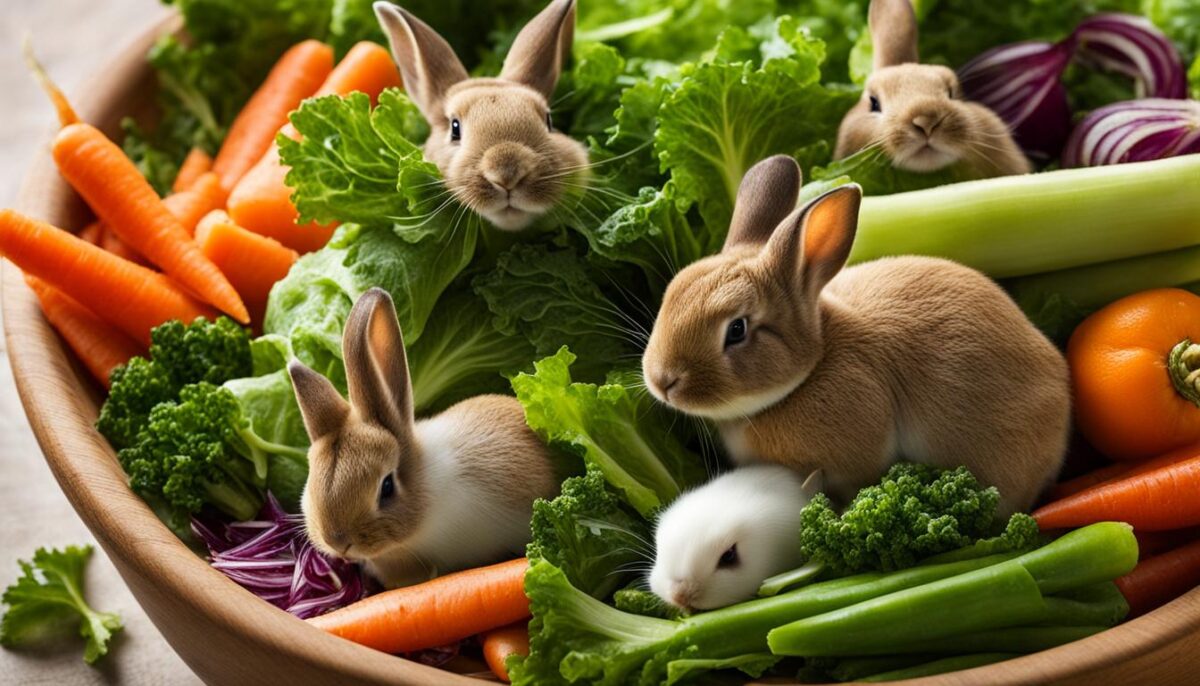
Bunny Pellets: A Nutritional Analysis
| Brand | Fiber Content (%) | Protein Content (%) | Calcium Content (%) |
|---|---|---|---|
| Brand X | 12 | 15 | 0.5 |
| Brand Y | 14 | 17 | 0.8 |
| Brand Z | 11 | 13 | 0.3 |
Essential Vegetables for a Rabbit’s Diet
Rabbits love vegetables, and incorporating them into their diet is essential for their overall health and well-being. When choosing vegetables for rabbits, it is important to select safe options that provide necessary nutrients. Most leafy greens and vegetables found in a supermarket are suitable for rabbits, but there are a few exceptions that should be avoided, such as potatoes, corn, beans, seeds, and nuts.
Adult rabbits should be given no more than 2 cups of fresh vegetables daily, while dwarf breeds and smaller rabbits should have around 1 cup. It is important to provide a variety of vegetables to ensure a well-rounded diet, and new vegetables should be introduced gradually to avoid digestive issues.
Here are some safe vegetables for rabbits:
- Bell peppers
- Bok choy
- Carrot tops
- Cucumber
- Spinach
- Romaine lettuce
- Kale
- Parsley
- Broccoli
These vegetables provide a range of essential nutrients and should be included in a rabbit’s daily diet. Remember to wash all vegetables thoroughly before feeding them to your rabbit.
| Vegetable | Nutritional Benefits |
|---|---|
| Bell peppers | High in vitamin C and fiber |
| Bok choy | Rich in vitamin A, vitamin C, and calcium |
| Carrot tops | Contain vitamin K, vitamin C, and fiber |
| Cucumber | High water content and a source of hydration |
| Spinach | Rich in iron, vitamin K, and vitamin A |
| Romaine lettuce | Good source of vitamin A and fiber |
| Kale | High in calcium, vitamin K, and vitamin C |
| Parsley | Contains vitamin C, vitamin K, and antioxidants |
| Broccoli | Rich in vitamin C, vitamin K, and fiber |
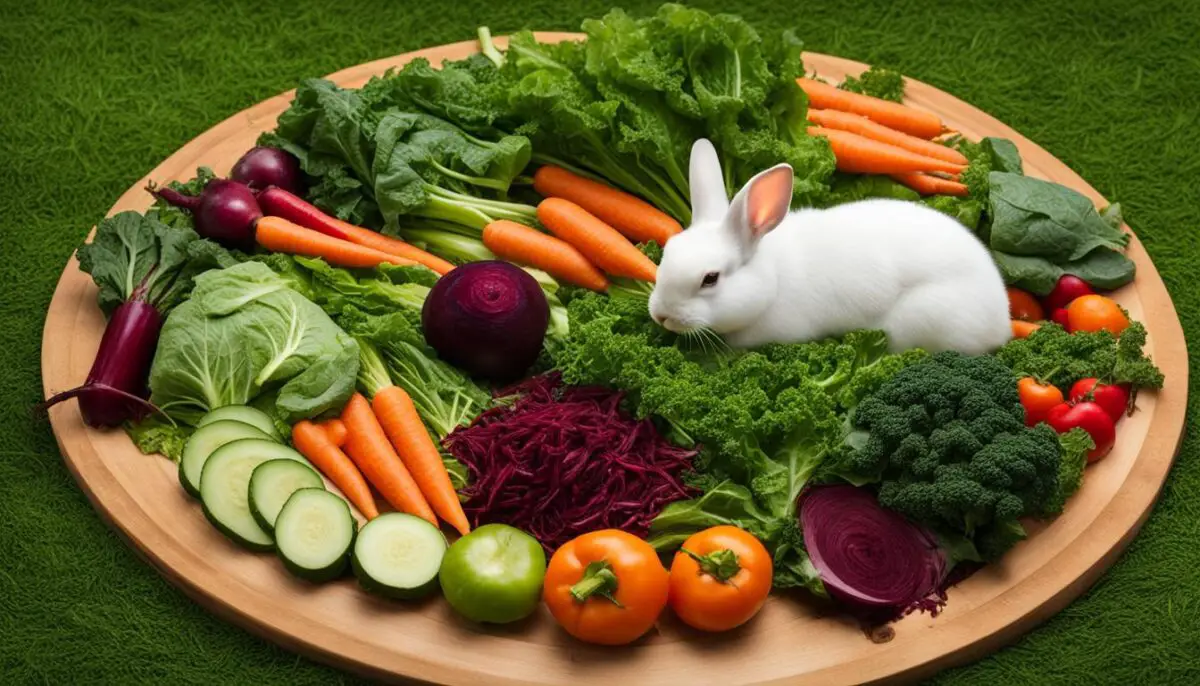
As with any new food introduction, it’s important to monitor your rabbit’s response and adjust the diet accordingly. Remember to remove any uneaten vegetables to prevent spoilage and promote freshness.
Adding a variety of vegetables to your rabbit’s diet ensures they receive a range of nutrients necessary for optimal health. By including safe vegetables like bell peppers, bok choy, carrot tops, cucumber, and more, you can provide your rabbit with a well-rounded and nutritious diet.
The Role of Fruits in a Rabbit’s Diet
Fruits play an important role in a rabbit’s diet, providing essential nutrients and adding variety to their meals. However, it’s important to offer fruits in moderation and choose safe options for your furry friend.
Fruits should be given to rabbits once or twice a week in limited quantities. The recommended serving is 1 to 2 tablespoons of fruit per 5 pounds of body weight. Introduce fruits slowly and one at a time to monitor for any digestive issues that may arise.
Safe fruits for rabbits include:
- Apple
- Banana
- Berries
- Cherries
- Grapes
- Melon
- And more
When offering high-sugar fruits like bananas and grapes, it’s important to give them only occasionally as treats. Too much sugar can lead to weight gain and other health issues in rabbits.
Remember to always wash fruits thoroughly and remove any seeds or pits before feeding them to your rabbit.
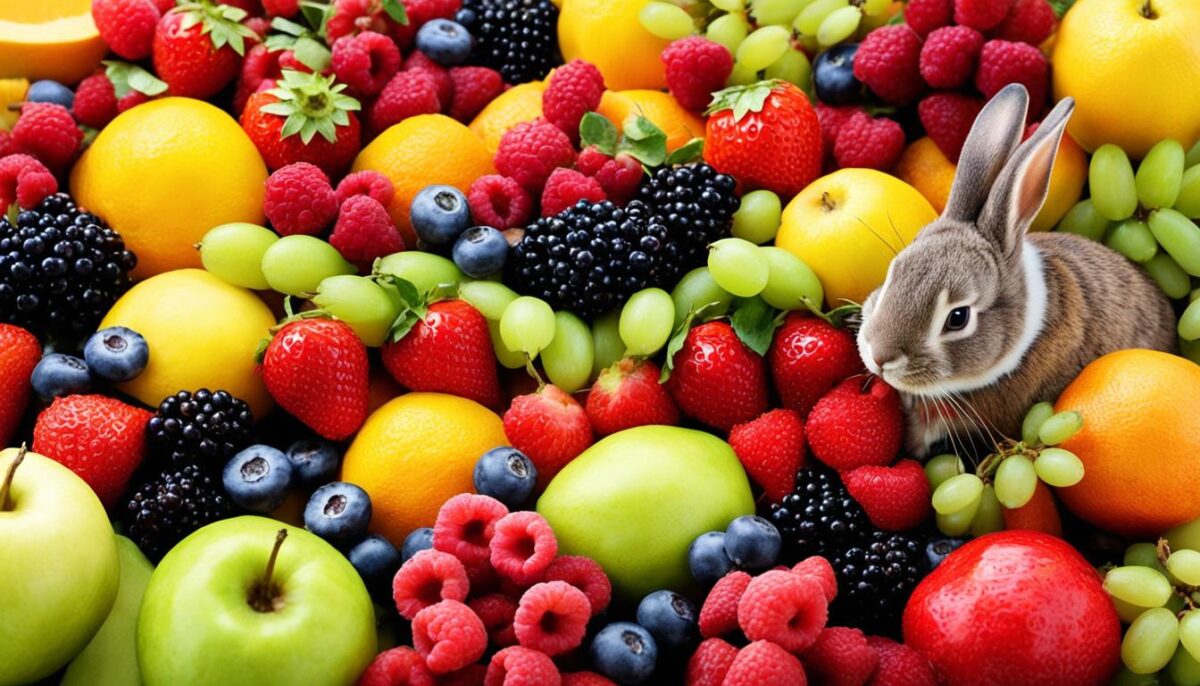
By including a variety of safe fruits in your rabbit’s diet, you can provide them with a well-rounded and enjoyable eating experience. Just remember to offer fruits in moderation and prioritize hay, pellets, and vegetables as the main components of their diet.
Rabbit Treats and What to Avoid
Rabbit treats are a fun way to spoil your furry friend, but they should be given sparingly. These treats are often high in calories and can lead to obesity if overfed. It’s important to choose healthy treats for rabbits that provide nutritional benefits. Here are some options:
- Fresh or freeze-dried fruit: Small pieces of fresh or freeze-dried fruit make for a tasty and healthy treat. Fruits like apples, bananas, and berries are safe for rabbits and provide essential vitamins and minerals. Just remember to offer them in moderation, as fruits contain natural sugars.
- Natural mixes: Look for natural mixes that include hay and dried flowers. These treats provide added fiber and variety to your rabbit’s diet. They are often available at pet stores or online.
- Specific rabbit treats: There are many brands that offer treats specifically made for rabbits. These treats are formulated to meet their dietary needs and are often low in calories. Look for reputable brands that prioritize your rabbit’s health.
When choosing treats, it’s essential to read the ingredients list. Avoid treats that contain added sugar, preservatives, and artificial coloring. These additives can be harmful to your rabbit’s health. Stick to treats made from natural ingredients.
Oscar Mayer, an experienced rabbit owner, shares his insight: “I always check the ingredients before buying treats for my rabbits. It’s important to choose treats that are free from harmful additives and artificial ingredients. Your rabbit’s health should always come first.”
It’s crucial to note that rabbit treats should never be substituted for their regular diet. Treats should only make up a small portion of their overall food intake. Remember to give treats as rewards or to provide enrichment, rather than as a staple in their diet.
On a related note, it’s important to avoid giving rabbits human treats. Many human foods are unsafe for rabbits and can cause digestive issues or even be toxic. Stick to treats specifically made for rabbits to ensure their well-being.
By choosing healthy treats and avoiding harmful additives, you can ensure that your rabbit enjoys their treats without compromising their health.
Conclusion
A healthy diet is crucial for the well-being of your pet rabbit. To ensure their optimal nutrition, it’s important to provide a balanced mix of hay, fresh vegetables and fruits, and a few pellets. Hay should be the main component of their diet, accounting for the majority of their daily intake. It helps maintain a healthy digestive system and keeps their teeth in good condition.
While hay is essential, it should be complemented by a variety of fresh vegetables and fruits. These should be given in moderation to prevent any digestive issues or imbalances. Choose a range of safe vegetables like bell peppers, bok choy, and carrot tops, and introduce new items gradually. Similarly, limit fruit servings to once or twice a week, focusing on low-sugar options such as apples, berries, and melons.
Pellets should only make up a small portion of your rabbit’s diet, ensuring they have a high fiber content. Selecting pellets specifically formulated for rabbits is crucial to avoid unnecessary additives. Additionally, treats should be used sparingly and only consist of healthy options like small pieces of fresh or freeze-dried fruit, or natural mixes that include hay and dried flowers. Be cautious of treats with added sugars, preservatives, or artificial colors.
Remember to provide your pet rabbit with fresh water at all times. By following these guidelines and making the appropriate dietary choices, you can ensure that your pet rabbit enjoys a healthy and nourishing diet. Proper nutrition plays a key role in their overall well-being and can contribute to their longevity and happiness as well.
FAQ
What does a pet rabbit eat?
Pet rabbits require a balanced diet that includes hay, fresh veggies and fruit, and a few pellets.
How much hay should be in a rabbit’s diet?
Hay should make up 80-90% of a rabbit’s diet.
What are the best types of hay for rabbits?
Good types of grass hay for rabbits include timothy, orchard grass, brome, and oat hay.
How much pellets should a rabbit eat?
Bunny pellets should only make up a small portion of a rabbit’s diet, about 5% or less.
What kind of pellets should I give to my rabbit?
Timothy hay pellets are recommended for adult rabbits, while alfalfa pellets are suitable for rabbits under 1 year old.
Can rabbits eat vegetables?
Yes, rabbits can eat vegetables. Safe vegetables for rabbits include bell peppers, bok choy, carrot tops, cucumber, and more.
Can rabbits eat fruits?
Yes, rabbits can eat fruits. Fruits should be given once or twice a week in limited quantities.
What fruits are safe for rabbits?
Safe fruits for rabbits include apple, banana, berries, cherries, grapes, melon, and more.
Can rabbits have treats?
Yes, rabbits can have treats, but they should be given sparingly as they are high in calories.
What are healthy treats for rabbits?
Healthy treats for rabbits include small pieces of fresh or freeze-dried fruit, natural mixes with hay and dried flowers, and specific rabbit treats from reputable brands.


